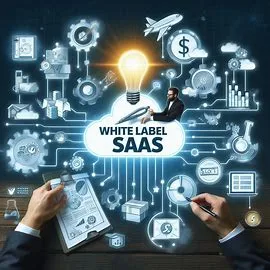Understanding White Label SaaS
White Label SaaS (Software as a Service) refers to a software product that is developed and owned by one company but rebranded and resold by another company under its own brand identity. This business model allows companies to offer software solutions without engaging in software development themselves. Essentially, the white-label approach provides an opportunity for businesses to customize and market the software as their own, saving time, energy, and resources on production and marketing costs.
Differences between White Label and Private Label SaaS
While both white label and private label SaaS models involve rebranding, there are key differences:
- White Label SaaS: The product is sold to multiple buyers who can customize and rebrand the software, but they do not own it. They only have a license to use and resell it.
- Private Label SaaS: The software is tailored specifically for a single customer, who has full control over design, branding, and specifications. This model offers more customization but usually at a higher cost.
An infographic can effectively illustrate the differences between these models for better understanding.
Growing Popularity in the SaaS Industry
The white label SaaS model has gained significant traction in the SaaS and marketing industries, appealing to businesses for several reasons:
- Lower Barrier to Entry: Companies can enter markets quickly without needing extensive development expertise.
- Rapid Customization: Software can easily be customized to align with a company’s brand identity.
- Cost Efficiency: Businesses save on development and marketing costs by leveraging existing solutions.
Benefits of White Label SaaS
Rapid Market Entry and Cost Advantages
White label SaaS allows businesses to enter the market quickly with ready-to-use platforms that can be rebranded as their own. This approach greatly reduces the time and resources required for product development. By focusing on marketing and customizing the software, businesses can leverage cost advantages without the burden of infrastructure development.
Scalability and Flexibility for Businesses
White label solutions are designed to scale as the business grows, enabling companies to add new features and accommodate more users with ease. This scalability ensures that a business can expand its online presence and meet increasing demand without the need for extensive redevelopment.
Expanded Product Offerings Without Extensive Development
White label SaaS enables businesses to rapidly expand their product offerings by rebranding and customizing existing platforms. This strategy allows companies to enter new markets and enhance revenue streams without the substantial investment associated with in-house development.
Market Dynamics in White Label SaaS
Increasing Demand for Customizable Solutions
As businesses seek platforms tailored to their unique needs, the demand for customizable SaaS solutions has increased. Customization options help businesses differentiate themselves and enhance user experiences.
Competition Among White Label Providers
The growing market for white label SaaS has intensified competition among providers. Companies must focus on quality, innovative features, customization options, and robust customer support to maintain a strong market position.
Evolution of White Label Offerings with Emerging Technologies
Emerging technologies such as AI, machine learning, and data analytics are enhancing white label SaaS solutions. These advancements offer smarter, more intuitive functionalities, ensuring that white label products remain relevant and valuable.
Profitability Considerations
Pricing Strategies for White Label Products
Effective pricing is essential for profitability. Here are some common strategies:
- Premium Pricing: Position the product as high quality with high initial prices.
- Penetration Pricing: Introduce the product at a low price to attract customers and raise prices later.
- Pricing Skimming: Start high and lower prices as the market evolves.
- Loss Leader: Offer low prices initially to gain long-term customer loyalty.
Balancing Licensing Costs and Profit Margins
Businesses must manage the balance between licensing costs and profit margins. Profit margin is the difference between the selling price and the cost. Companies should aim to acquire products at lower costs and enhance their competitiveness using advanced pricing software for data-driven decisions.
Importance of Value-Added Services
Value-added services differentiate white-label products and justify premium prices. These services may include customizable features, dedicated customer support, training programs, and advanced analytics which enhance brand reputation and foster customer loyalty.
Challenges and Risks
Limited Control Over Product Development
One significant challenge is the limited control over product development. Businesses relying on external providers may face delays in updates or new features. Mitigating this risk involves meticulous vendor selection and maintaining an open feedback channel.
Potential Quality Inconsistencies
Quality control can be a concern, as inconsistencies from external providers may affect brand reputation. Businesses should maintain stringent quality assurance processes and regular vendor audits to address this issue.
Dependence on White Label Provider
Reliance on a white label provider poses risks, especially if the provider fails to deliver timely updates or support. Establishing clear service-level agreements (SLAs) and having contingency plans can mitigate this risk.
Strategies for Success
Thorough Market Research and Product Selection
Thorough market research is crucial for success. Understanding market needs, identifying pain points, and analyzing competitors helps in making informed product choices.
Effective Branding and Customization
A strong branding strategy is essential, focusing on unique value propositions and consistent promotion. Customization allows businesses to offer tailored solutions, fostering customer loyalty.
Focus on Customer Support and Value-Added Services
Exceptional customer support is vital for retaining customers. Providing value-added services enhances brand reputation and creates differentiated market positioning.
Future Trends in White Label SaaS
Integration of AI and Machine Learning
AI and machine learning are transforming white label SaaS by enabling hyper-personalization, automating tasks, and enhancing cybersecurity. These technologies improve user experiences and customer satisfaction.
Expansion into New Industry Verticals
White label SaaS is expanding into verticals like healthcare and finance, providing industry-specific functionalities that cater to unique needs.
Increased Focus on Data Analytics and Reporting
Businesses are adopting white label analytics to integrate third-party analytics with their software. Enhanced data analytics enable deeper insights and data-driven decision-making.
Conclusion
The integration of AI, expansion into industry-specific verticals, and focus on advanced data analytics are driving the future of white label SaaS. Businesses must adapt to these trends to stay competitive and offer innovative solutions to their customers.





0 Comments